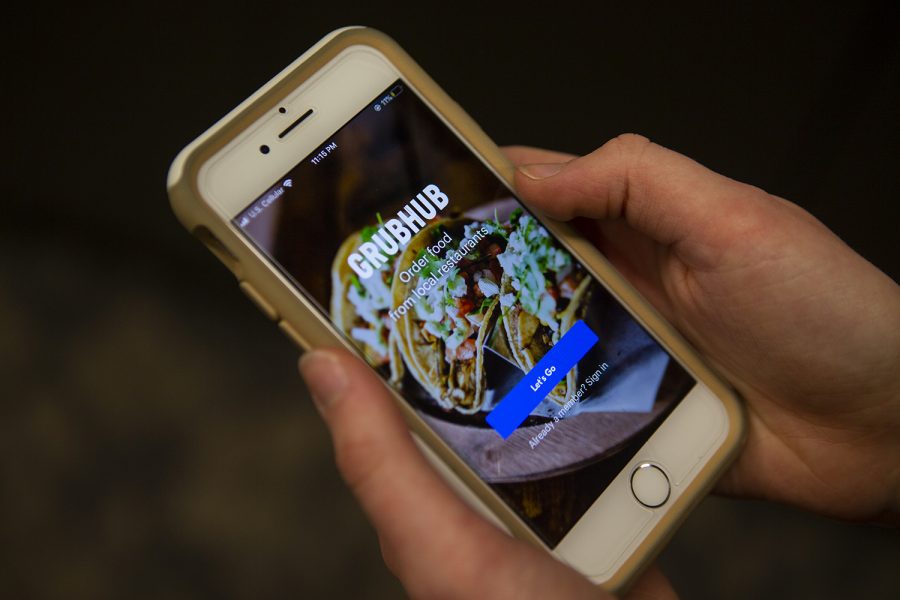Grubhub adds several local businesses to app without their knowledge
Grubhub, a national food delivery service, added local Iowa City businesses earlier this month without contracts from restaurants to the confusion and anger of local owners.
Photo Illustration by Jenna Galligan
March 5, 2020
Grubhub, a national food-delivery service, has added several local Iowa City restaurants to its delivery-service app and website without the permission of the companies’ owners — a move that several local restaurant owners are not happy about.
Ofer Sivan, co-owner of Iowa City’s Oasis Falafel, said his restaurant was added to the platform, even though Oasis already had a contract with CHOMP, a local Iowa City and Cedar Rapids food-delivery service.
Even though his company hasn’t received any complaints from customers, he said it still affects the validity of his business.
“These companies violated my trust and lied to my customers,” Sivian said. “The name, the logo, and the business belong to me and my business partners. We have put money and time and work into the brand. [Grubhub is] presenting themselves to the public as if we are partners and they are presenting information that is often inaccurate. If someone clicks on it, they’d assume that it’s correct information when it’s not.”
In an email to The Daily Iowan, Grubhub spokesperson Jenna DeMarco said the decision to add these restaurants was because of consumer demand so businesses can receive more orders and revenue.
“This is a model that other food delivery companies have been doing for years as a way to widen their restaurant supply,” DeMarco said. “We’re trying it as well to create a level playing field. We believe partnering with restaurants is the only way to drive long-term value in this business—and have only added non-partnered restaurants to close the supply gap to our competitors.”
Related: GPSG creates local-restaurant passport for climate-conscious eating
This tactic is not new to Iowa City, said Adam Weeks, co-founder of CHOMP. He said that multiple companies have used this maneuver in recent years and months, but it is new for Grubhub, which has added approximately 90 restaurants to its app. Grubhub is also deploying this strategy nationwide, according to an article from the BBC.
“Adding restaurants without their permission is not a new concept,” he said. “This is how Doordash’s model works and how they entered the Iowa City market. It appears that Postmates is now doing it in this area as well…It’s a predatory business model. They use [a restaurant’s] logo and their menu and sell their food, but the customers will contact the restaurant instead of the delivery service if there are any issues.”
Sivan said Grubhub was not the first major or local company that has added Oasis Falafel to their service without permission.
“Just one or two weeks ago Postmates had a page [with Oasis Falafel] up and I emailed them and they took it down,” he said. “Companies that no longer exist like EatStreet and OrderUp have done this to us. At least six or seven times, this has happened.”
This was also not the first time that Grubhub had done this to the Hamburg Inn No. 2 said the restaurant’s General Manager, Seth Dudley. He said he has found an unauthorized page for the Hamburg Inn multiple times. He said it also took over a week to get the Hamburg Inn’s page taken off of Grubhub this time.
“I’ve received emails from Grubhub, saying they’d love to add us,” he said. “I’ve responded saying I don’t want anything to do with your company. Three days later, I found out we were on their site after I explicitly told them no.”
This business model is completely legal, said Wendy Ford, the economic development coordinator for the Iowa City City Manager’s Office.
She said there is a chance that there could be a law- or ordinance-change pertaining to this issue in the future, but without one currently, delivery companies can continue to use this business model.
“There’s no law or ordinance that says [Grubhub] can or cannot do this,” she said. “The idea for bringing forward anything would probably come from the people who are the most affected. It wouldn’t be something initiated by the city or state.”
Alternate solutions for restaurants, however, are not simple either, said Weeks, the CHOMP owner. It is nearly impossible to get restaurants taken off delivery services without negative repercussions, he added.
“They will eventually block the restaurants, but they won’t remove them from the list of venues on Grubhub when a company asks to be removed,” Weeks said. “It says that a restaurant isn’t taking deliveries or closed which is technically not true, it’s just not through Grubhub. Getting removed from the platform is difficult and time consuming. Restaurants shouldn’t be put in this situation to begin with because it’s their brand, logo, and menu.”



